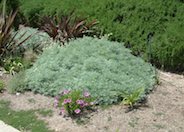
Common name:Powis Castle Artemisia
Botanical name:Artemisia 'Powis Castle'
This mounding shrub reaches 3' high and up to 5' wide with fine silver foliage. - Cornflower Farms
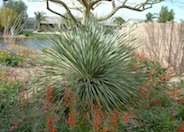
Common name:Desert Spoon, Sotol
Botanical name:Dasylirion wheeleri
Spoon-Yucca requires little maintenance, as it tolerates drought, reflected heat and poor soils. It develops a short, thick trunk while reaching 6' tall and wide. Leaves are linear gray-green to 3' long and armed. During late spring and summer, erect stems of white creamy flowers are visible. It is a long lived shrub and slow-growing. It needs a well-drained site; it is cold and drought hardy.
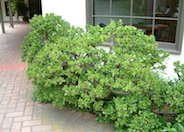
Common name:Jade Plant
Botanical name:Crassula ovata
Crassula ovata is an evergreen shrub that grows to 2' to10' tall and 3' to 6' wide with light green leaves. It like full sun, low watering, and will live in any type of well drained soil.
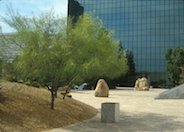
Common name:Mexican Palo Verde, Jerusalem Thorn
Botanical name:Parkinsonia aculeata
The Mexican Palo Verde has prickly stems. This tree is very fast growing with sparse foliage and very long narrow leaves. Yellow flowers with orange red throats bloom sporadically. It is very messy, thorny, weedy and short-lived. This tree is usually found on limestone soils in areas with moisture but is strongly drought tolerant. It can withstand saline conditions. It can be cold or drought deciduous. It is beautiful in form being light and airy looking, with green bark.
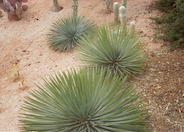
Common name:Our Lord's Candle
Botanical name:Hesperoyucca whipplei
Stemless, it produces dense clusters of rigid, gray green leaves 12"-18" long. Its drooping, bell-shaped flowers appear on large, branched spikes 3'-6' long. Plants die after blooming, much like Agaves, but only individual rosettes will die off; others in clump will continue to live and eventually bloom. Overall plant grows 3' tall and 6' wide. This CA native prefers well drained soil and is drought tolerant but will lose lower leaves with extended drought..
| Designer: | Walk in the West |
Photographer: GardenSoft |
Soils and Compost:
Practice grass-cycling by leaving short grass clippings on lawns after mowing, so that nutrients and organic matter are returned to the soil.
Water Saving Tip:
Integrated Pest Management:
Drip and other smart irrigation delivers water directly to roots, allowing no excess water for weeds.
